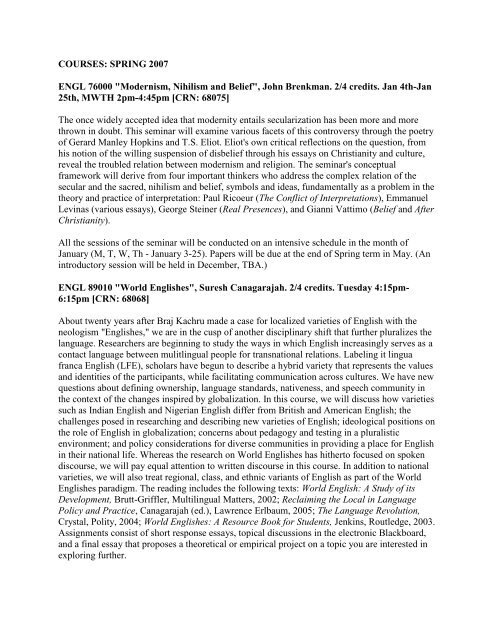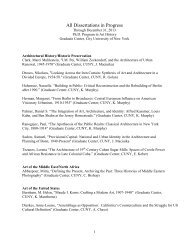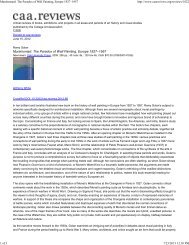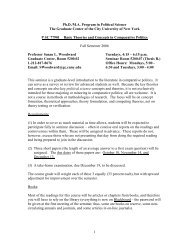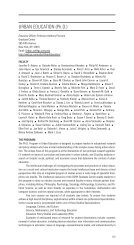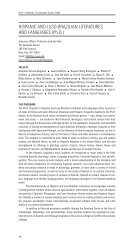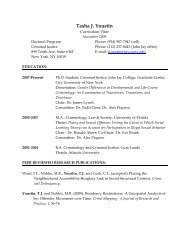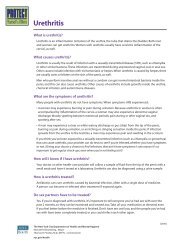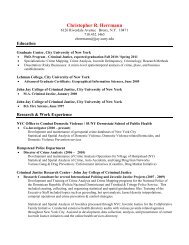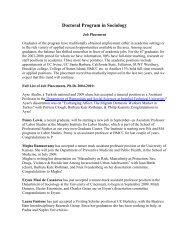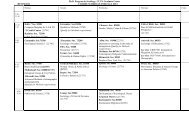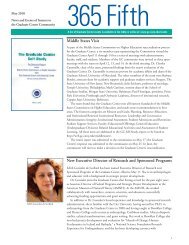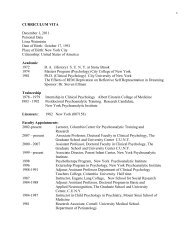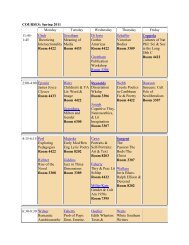SPRING 2007 ENGL 76000 - CUNY Graduate Center
SPRING 2007 ENGL 76000 - CUNY Graduate Center
SPRING 2007 ENGL 76000 - CUNY Graduate Center
Create successful ePaper yourself
Turn your PDF publications into a flip-book with our unique Google optimized e-Paper software.
COURSES: <strong>SPRING</strong> <strong>2007</strong><br />
<strong>ENGL</strong> <strong>76000</strong> "Modernism, Nihilism and Belief", John Brenkman. 2/4 credits. Jan 4th-Jan<br />
25th, MWTH 2pm-4:45pm [CRN: 68075]<br />
The once widely accepted idea that modernity entails secularization has been more and more<br />
thrown in doubt. This seminar will examine various facets of this controversy through the poetry<br />
of Gerard Manley Hopkins and T.S. Eliot. Eliot's own critical reflections on the question, from<br />
his notion of the willing suspension of disbelief through his essays on Christianity and culture,<br />
reveal the troubled relation between modernism and religion. The seminar's conceptual<br />
framework will derive from four important thinkers who address the complex relation of the<br />
secular and the sacred, nihilism and belief, symbols and ideas, fundamentally as a problem in the<br />
theory and practice of interpretation: Paul Ricoeur (The Conflict of Interpretations), Emmanuel<br />
Levinas (various essays), George Steiner (Real Presences), and Gianni Vattimo (Belief and After<br />
Christianity).<br />
All the sessions of the seminar will be conducted on an intensive schedule in the month of<br />
January (M, T, W, Th - January 3-25). Papers will be due at the end of Spring term in May. (An<br />
introductory session will be held in December, TBA.)<br />
<strong>ENGL</strong> 89010 "World Englishes", Suresh Canagarajah. 2/4 credits. Tuesday 4:15pm-<br />
6:15pm [CRN: 68068]<br />
About twenty years after Braj Kachru made a case for localized varieties of English with the<br />
neologism "Englishes," we are in the cusp of another disciplinary shift that further pluralizes the<br />
language. Researchers are beginning to study the ways in which English increasingly serves as a<br />
contact language between mulitlingual people for transnational relations. Labeling it lingua<br />
franca English (LFE), scholars have begun to describe a hybrid variety that represents the values<br />
and identities of the participants, while facilitating communication across cultures. We have new<br />
questions about defining ownership, language standards, nativeness, and speech community in<br />
the context of the changes inspired by globalization. In this course, we will discuss how varieties<br />
such as Indian English and Nigerian English differ from British and American English; the<br />
challenges posed in researching and describing new varieties of English; ideological positions on<br />
the role of English in globalization; concerns about pedagogy and testing in a pluralistic<br />
environment; and policy considerations for diverse communities in providing a place for English<br />
in their national life. Whereas the research on World Englishes has hitherto focused on spoken<br />
discourse, we will pay equal attention to written discourse in this course. In addition to national<br />
varieties, we will also treat regional, class, and ethnic variants of English as part of the World<br />
Englishes paradigm. The reading includes the following texts: World English: A Study of its<br />
Development, Brutt-Griffler, Multilingual Matters, 2002; Reclaiming the Local in Language<br />
Policy and Practice, Canagarajah (ed.), Lawrence Erlbaum, 2005; The Language Revolution,<br />
Crystal, Polity, 2004; World Englishes: A Resource Book for Students, Jenkins, Routledge, 2003.<br />
Assignments consist of short response essays, topical discussions in the electronic Blackboard,<br />
and a final essay that proposes a theoretical or empirical project on a topic you are interested in<br />
exploring further.
<strong>ENGL</strong> 87400 "Art and Texts: Portraits and Self-Portraits", Mary Ann Caws. 2/4 credits.<br />
Monday 4:15pm-6:15pm [CRN: 68076]<br />
The representation of persons to themselves and to others is what we will be looking at,<br />
including group and individual portraits. We will cast a deliberately wide net, among the<br />
immense possibilities in photographs, paintings, and writing,. from periods early to<br />
contemporary, but with an emphasis on modernism, broadly conceived.<br />
Among the topics considered are face and body, clothing and costume, nudity and disguise, self<br />
and other, gender and transgendering, set pieces of description and fragmentary suggestions,<br />
youth and aging, and differentiation by region and epoch.<br />
Some of the subjects that leap to mind as examples may enter our deliberations: on the visual<br />
side, Rembrandt's self-portraits over the years, portraits and self-portraits by Cézanne and<br />
Picasso , Claude Cahun's and Cindy Sherman's self-posings as the other, Avedon's portraits and<br />
those of Man Ray, and on the literary side, various descriptions and workings out of character by<br />
George Eliot, Herman Melville, Nathanael Hawthorne, Henry James, Marcel Proust, Gertrude<br />
Stein,Virginia Woolf, and Wallace Stevens.<br />
Class presentations about the visual and the verbal, a short and a long paper.<br />
<strong>ENGL</strong> 75300 "American Modernism", Morris Dickstein. 2/4 credits. Tuesday 2pm-4pm<br />
[CRN: 68077] Cross listed with ASCP<br />
Beginning with the ferment of European modernism in the years just preceding World War I, this<br />
course will investigate how modernism gradually took hold in the United States but also among<br />
expatriate American artists who went abroad for their aesthetic education. The principal focus<br />
will be on fiction and poetry but with some attention to music, the visual arts, and social<br />
criticism. The course will explore the influence of the 1913 Armory Show and the patronage of<br />
Alfred Stieglitz, whose galleries exposed Americans to new currents in the arts, and it will show<br />
how the war and its aftermath, as well as indigenous social conflicts, helped transform the United<br />
States into a nation not only grappling with modernity but representing it to the world.<br />
The course will examine the links between aesthetic and political radicalism that developed in<br />
bohemian circles during the war, but also the relationships between formal experimentation and<br />
dramatic changes in social or moral outlook, including the revolt against puritanism and gentility<br />
and the changing position of women. We'll highlight the role of little magazines in creating a<br />
new minority culture, which ultimately enjoyed wide influence. The main material will be the<br />
work of writers like Stein, Eliot, Pound, O'Neill, William Carlos Williams, Hart Crane, Marianne<br />
Moore, Robert Frost, Wallace Stevens, Nella Larsen, Scott Fitzgerald, Ernest Hemingway, and<br />
William Faulkner, but also composers and musicians such as Aaron Copland, George Gershwin,<br />
and Louis Armstrong, as well as the painters and photographers of the Stieglitz circle, including<br />
Marsden Harley, Arthur Dove, and Paul Strand.<br />
Course requirements include class participation, an oral report, and a 15-page research paper on<br />
some aspect of modernism.
<strong>ENGL</strong> 75200 "America in the 1890's", Marc Dolan. 2/4 credits. Tuesday 11:45am-1:45pm<br />
[CRN: 68078] Cross listed with ASCP<br />
In many ways, the 1890s was the first decade of the twentieth century. For the United States, the<br />
decade saw, if not quite the arrival of modernity or the birth of modernism, the seeds of what<br />
would become modern American culture. By 1890, the truly national economy that had been<br />
slowly binding the states together since the War of 1812 now seemed to have a life of its own.<br />
Corporations were now real enough to be seen as "individuals" in the eyes of the law. With<br />
Plessy v. Ferguson (1896), the Supreme Court guaranteed the constitutional right to separate<br />
"black" and "white" citizens by statute, while at the same moment the rise of ragtime virtually<br />
ensured that those citizens would be mingled by culture forever after. Whether "pure" or<br />
"mixed," the categories of race now seemed to matter more than the old national divisions by<br />
region, but race was much broader than just black and white for Americans of the 1890s. It also<br />
sorted into distinct racial categories the massive waves of Eastern and Southern European<br />
immigrants that those who were born in the U.S. could not quite accept would soon be their<br />
fellow citizens. The world was now coming to the United States, just as the United States was<br />
now bringing itself to the world. By the end of the decade, with the conclusion of the Spanish<br />
American War, the United States became a truly global power for the first time in its history,<br />
accepting an imperial status in the Philippines that it had tried to shrug off or deny in its own<br />
hemisphere for at least half a century. The most telling germ of America's eventual dominance of<br />
global culture, however, lay not so much in its military activities in foreign countries during this<br />
period as in the simultaneous inception within the U.S. of three industries in which the nation<br />
would soon surpass all competitors: advertising, film production, and sound recording.<br />
This course will examine some, but obviously not all, of these transformations and will feature<br />
in-class visits from faculty members of the American Studies Certificate Program based in the<br />
Ph. D. Programs in Art History, English, History, and Music. In addition, we may consider: the<br />
Panic of 1893, Populism, and the crisis of bimetallism; the Chicago Columbian Exposition and<br />
the architectural legacy of its ambiguous White City; the "winning of the west," the "closing of<br />
the frontier," and the tragic fate of the "Ghost-Dance" movement at Wounded Knee; the high tide<br />
of naturalism in all the arts; social science and/or/as religion; populism, ruralism, regionalism,<br />
and provincialism; and the cult of the Civil War.<br />
Course requirements include class participation, an oral presentation of original scholarship on<br />
U. S. life during the period, and a final paper that expands on the presentation.<br />
<strong>ENGL</strong> 86000 "James Joyce Ulysses", Edmund Epstein. 2/4 credits. Monday 2pm-4pm<br />
[CRN: 68071]<br />
We will go over James Joyce's Ulysses in detail, reading from the text and commenting on it. We<br />
will also discuss methods of teaching Ulysses, and theoretical issues involving the innovative<br />
techniques of Joyce, his methods of narrative, and his profound influence on modern literature.<br />
We will bring into the discussion some of the other works of Joyce--Dubliners, A Portrait of the<br />
Artist as a Young Man, and relevant parts of Finnegans Wake-- for elucidation of Joyce's<br />
methods and techniques--as well as modern novels by other writers influenced by Joyce.
<strong>ENGL</strong> 79500 "Theory and Practice of Literary Scholarship", David Greetham. 4 credits<br />
Intersession (TBA) [CRN: 68079]<br />
As in the version offered by Professor Kruger in the full Spring semester, this special<br />
intersession course being given in January takes up questions both practical and theoretical about<br />
what it means to do scholarship in the discipline of "English," Theoretically, we consider what it<br />
means to study a national language and literature that has become global in its reach; we examine<br />
the boundaries of the discipline, how it intersects with but also is differentiated from other<br />
disciplines and interdisciplinary fields (and thus the concept of "disciplinarity" itself); we<br />
consider how varied theories of language, text, narrative, poetics, author, gender, race, psyche,<br />
society, culture, history, identity, politics (etc.) define, in sometimes complementary but also<br />
sometimes contradictory ways, the discipline as it has emerged (and changed) since its first being<br />
added to the university curriculum as a "vernacular" version of "classical" studies. Practically,<br />
we take up the question of how we define objects of inquiry within "English" studies, how we<br />
research such topics, how we identify the main debates currently circulating around them, how<br />
we develop new knowledge -- in sum, we consider nitty-gritty questions crucial to pursuing<br />
graduate and professional work in literary scholarship. The course follows four main lines of<br />
inquiry, examining 1) the historical, institutional context of the discipline, 2) archival and<br />
bibliographical work, 3) concepts of textuality, and 4) theoretical approaches.<br />
Requirements: Preparations for all class discussions and several in-class presentations. The final<br />
paper is similarly flexible: students may produce one of three possibilities-a scholarly "edition"<br />
of a short work embodying the textual principles discussed in the course; an introduction to such<br />
an edition or collection of works, focusing on the archival and other cultural issues involved; a<br />
critical essay founded on the archival, bibliographical, and textual approaches explored. I am<br />
also open to other methods of integrating the "scholarly" and "critical" components of the course.<br />
Organization: I will be teaching the "intensive" intersession version of this course during the<br />
month of January <strong>2007</strong>, and the usual semester-long version will be given in the Spring by<br />
Professor Kruger. The alternatives present obvious advantages and disadvantages: in the<br />
intersession version we complete the course before the semester proper has begun, thus freeing<br />
up students to take a full roster of "regular" courses during the Spring, and because the<br />
intersession course is officially a "Spring" offering, students have the whole of the Spring<br />
semester to complete the final paper. Moreover, January is "bibliography" month in New York,<br />
and I have usually managed to get some of the leading visiting archivists, bibliographers, editors,<br />
and textuists to participate in the intersession class (as well as presentations of their final projects<br />
by former students of the course): students will thus be able to interrogate some of those authors<br />
they have read. And, because we meet often and for extended periods, students have usually<br />
found that there is a greater narrative impetus to the intersession version, and a greater sense of<br />
"group" interaction. The main challenge is, of course, that we have to devote pretty much the<br />
whole of January to completing this required course: that has usually meant meeting twice a<br />
week (normally Tuesdays and Fridays) for at least three hours, with an introductory<br />
organizational meeting held at the end of the Fall semester. The balance in the intersession<br />
version is therefore more toward reading and preparation for discussion than in actual archival<br />
work in local libraries, which can be done with more leisure and lead time in the conventional
semester-long version. As usual, there will be an organizational meeting December to discuss<br />
scheduling.<br />
<strong>ENGL</strong> 80600 "On Late Style: An Interdisciplinary Expedition", David Greetham and<br />
Richard Kramer. 2/4 credits. Wednesday 11:45am-1:45pm [CRN: 68086] Cross listed with<br />
Music 87000 and IDS 81620<br />
An interdisciplinary seminar on the concept and practice of "late" style, focusing primarily on<br />
music and literature with forays into art history, architecture, film, theatre, psychology, and<br />
history. We take as our starting point Edward Said's On Late Style: Music and Literature Against<br />
the Grain (Pantheon 2006), interrogating his key concepts: "anachronism and anomaly,"<br />
"intransigence, difficulty, and unresolved contradiction," and lateness as a form of "exile," and<br />
exploring how such types of "lateness" might function in a wide range of aesthetic environments.<br />
As an initial step, we ask "What is Style," and begin by re-examining some of the "classic"<br />
statements on style-by F. L. Lucas, Peter Gay, Meyer Shapiro, Charles Rosen. We then ask<br />
"What is Late Style," engaging among others Adorno's classic statements, together with readings<br />
in Jauss, Lukacs, Lyotard and Dahlhaus. Subsequent meetings will be clustered around these<br />
larger rubrics: The Historical Construction of Late Style (Beethoven and Goethe;<br />
Shakespeare; the reinvention of Bach); Perceptions of Late Style at fin-de-siècle (Thomas<br />
Mann, Death in Venice, Visconti's filming of it, and Britten's last opera; Freud, Moses and<br />
Monotheism; Mahler, Das Lied von der Erde, and, in memory of fin-de-siècle, Strauss, Capriccio<br />
and Metamorphosen); and Confronting Lateness, exploring such topics as late Chaucer, late<br />
Wagner, late Stravinsky, late Joyce, late Keats, late Verdi, late Welles, late Miles Davis, late<br />
Matisse, late Sophocles, late Picasso, late Coltrane, late Melville, late Dickinson, late Moore<br />
(Marianne, Henry), late Richard Wright, late T. S. Eliot, late Langston Hughes, late Morrison,<br />
late Elliott Carter.<br />
We invite students from any area of the Humanities and Arts in which a creative idiolect (or<br />
"style") plays both against a cultural context and against the creator's own sense of "history." To<br />
further illuminate the discussion, we have invited guests from other disciplines.<br />
Students will be encouraged to work as much outside their home discipline as within it, and will<br />
produce a semester paper in which some aspect of "lateness" is explored in more than one<br />
discipline. No previous technical knowledge of music is expected.<br />
<strong>ENGL</strong> 80600 "Foucault and Literature", Tom Hayes. 2/4 credits. Friday 2pm-4pm [CRN:<br />
68064]<br />
In this course we will analyze the formation of the subject as s/he may appear on the other side<br />
of a normative division, becoming the object of knowledge-as a madman ( in Dickens's Pickwick<br />
Papers), or as a madwoman (in Rhys's Wide Sargasso Sea) or as a patient (in Patrick McGrath's<br />
The Asylum) or as a psychopath (in Ian McEwan's The Comfort of Strangers) as seen in light of<br />
Foucault's Madness and Civilization, The Birth of the Clinic, and Discipline and Punish.<br />
Foucault's favorite novel was Malcolm Lowry's Under the Volcano. Foucault was also fascinated<br />
by the anonymous Victorian classic My Secret Life. We will read these texts with special<br />
attention to Foucault's concern with the subject qua subject. That is, we will try to understand
how the subject becomes an object of knowledge in a literary text. Of special importance here is<br />
Foucault's Foreword to Pierre Riviere.<br />
<strong>ENGL</strong> 83300 "Biography, Autobiography and Pseudo-biography in the Long Eighteenth<br />
Century", Carrie Hintz. 2/4 credits. Friday 11:45am-1:45pm [CRN: 68070]<br />
The course will explore life writing in the long eighteenth century (biography, autobiography,<br />
and pseudobiography) and novels from the period that draw on the conventions of life writing.<br />
There will be less emphasis on the definition of genres than on the rhetorical strategies of<br />
individual authors and their navigation of public and private discourses. We will, however,<br />
engage with a number of life writing genres, including conversion narratives, criminal<br />
biographies, diaries, captivity narrative, letters, pornography, "secret histories" hagiography, and<br />
travel writing. Possible texts include John Aubrey's Brief Lives [selections]; John Bunyan's<br />
Grace Abounding to the Chief of Sinners; The Narrative of the Captivity and Restoration of Mrs.<br />
Mary Rowlandson; The Case of Madam Mary Carleton, lately stiled the German Princess;<br />
Defoe's Robinson Crusoe and/or Moll Flanders; A Narrative of the Life of Mrs. Charlotte<br />
Charke; Samuel Johnson's Lives of the Poets [selected]; John Cleland's Fanny Hill; Henry<br />
Fielding's Jonathan Wild; The Life of Olaudah Equiano, Mary Wollstonecraft's Short Residence<br />
in Sweden, Norway and Denmark; William Godwin's Memoirs of the Author of 'The Rights of<br />
Woman,' and Thomas De Quincey's Confessions of an English Opium Eater.<br />
The course is designed for potential specialists in Restoration and eighteenth-century literature<br />
but also for students reading for their comprehensive examinations. Our reading should appeal to<br />
anyone interested in theories of auto/biography by writers such as Sidonie Smith and Julia<br />
Watson, Paul John Eakin, Leigh Gilmore, Richard Wendorf and Paula R. Backscheider (among<br />
many others). We will also be looking at theories of authorship, narrative and of the historical<br />
development of the private sphere. Course requirements include class participation, an oral<br />
presentation, and a final paper [about 15-20 pages].<br />
<strong>ENGL</strong> 75200 "From Gift to Community: The Economics of Early American Fiction",<br />
Hildegard Hoeller. 2/4 creditsWednesday 2pm-4pm [CRN: 68080]<br />
In this course we will read early American fiction from the later eighteenth century to the middle<br />
of the nineteenth century with an emphasis on the more recently rediscovered, re-printed, and<br />
reconsidered American women writers and African-American writers. Writers will include some<br />
of the following: Lydia Maria Child, James Fenimore Cooper, Susan Warner, Herman Melville,<br />
Frances Harper, Harriet Wilson, Hannah Webster Foster, Susanna Rowson, E.D.E.N.<br />
Southworth, Maria Cummins, Lydia Sigourney, William Wells Brown, and Harriet Beecher<br />
Stowe. We will take a new economic approach to their fiction, in which we will pay particular<br />
attention to the economics of this early American fiction. In order to do so we will delve into gift<br />
theory, a fascinating, complex, interdisciplinary, and wide-ranging conversation about social<br />
relations and how they are governed by different modes of exchange, such as gift and commodity<br />
exchange. This conversation spans from early anthropological renditions of non-monetary<br />
cultures and their tribal structures based on gift exchange and sacrifice, such as Marcel Mauss's<br />
The Gift, to Jacques Derrida's compelling and obsessive ruminations about the (im)possibility of<br />
gift giving and the (ir)responsibility of sacrifice in his books Given Time: Counterfeit Money and
The Gift of Death. To Derrida the gift is utterly necessary as his way of being outside of logos<br />
and in the presence of the good, God, the other, and yet he sees the gift as annulling itself the<br />
minute it becomes recognized and turns into debt and obligation. In his writing about the gift, we<br />
see the great deconstructionist movingly wrestle with God.<br />
Broadly speaking, in a culture both capitalist and Christian, Americans were torn between the<br />
two competing cultural ideals of self-interest and self-sacrifice, and novels-more than other<br />
forms of literature-with their interest in depicting social relations register these tensions.<br />
Furthermore, domestic, rural, and native American cultures often relied on gift exchange while<br />
urban, industrialized America was increasingly governed by capitalism's logic of monetary selfinterest<br />
and profit. Novels depict the workings of both economies and reveal the ways in which<br />
gifts and commodities tend to collide and taint each other. The novel itself, a commercial form<br />
resulting from an artist's attempt to turn his or her artistic gift into a marketable commodity,<br />
implies such a collision. Finally, slavery posed a most troubling challenge to the separation of<br />
gift and commodity since it turned the most essential, inalienable gift of life into a commodity<br />
and thus threatened the innermost fabric of social relations.<br />
Using a new economic approach to early American fiction will allows us to understand some of<br />
these novels' central concerns as well as their cultural and historical contexts. It will also enable<br />
us to find new approaches to questions of gender, race, genre, and canonicity. In short, we will<br />
be able to construct innovative readings of these texts by tracing the economics of this fiction<br />
and thus contribute to the rapidly expanding recent criticism on early American fiction.<br />
<strong>ENGL</strong> 87100 "Novelistic Ethnography and Ethnographic Novels", Gerhard Joseph. 2/4<br />
credits. Wednesday 11:45am-1:45pm [CRN: 68065]<br />
With a contemporary South-African novel (Coetzee's Waiting for the Barbarians) as an<br />
introductory frame, this course will consider a variety of nineteenth- and twentieth-century<br />
realist literary texts (mostly novels) through the lens provided by an emerging realist and postrealist<br />
critical ethnography (E. B. Tylor, James Frazer, Bronislaw Malinowski, Lucien Lévi-<br />
Bruhl, George Stocking, Jr., Claude Lévi-Strauss, James Clifford, Clifford Geertz, Christopher<br />
Herbert, Mary Douglas, Karen Knorr-Cetina, Donna Haraway, Sandra Harding, Trinh T. Minhha,<br />
James Buzard, Patricia Clough, Vincent Grapanzano, et. al.), a body of work that has greatly<br />
expanded the sense of what kinds of texts may nowadays be called ethnographies. One aim will<br />
be to track the nineteenth-century, pre-disciplinary emergence of a pair of crucial ethnographic<br />
terms--culture and participant observation--that helped establish the generic conventions<br />
(implicit in Harding's standpoint epistemology, Haraway's situated knowledges, etc.) by which<br />
distinct cultures and sub-cultures have come to be represented in our disciplinary and postdisciplinary<br />
discourse. A particular question arises from such considerations: what are the<br />
possibilities and limitations of autoethnography, the authoritative description of a culture by<br />
insiders as over against the perspective of outsiders? Requirements: an oral report and a term<br />
paper.
<strong>ENGL</strong> 84500 "Hardy, Lawrence, Lessing", Richard Kaye. 2/4 credits. Thursday 6:30pm-<br />
8:30pm [CRN: 68063]<br />
This course traces an important line of influence over several epochs through a reading of three<br />
brilliant practitioners of British realist fiction: the Victorian Thomas Hardy, the modernist D.H.<br />
Lawrence, and the contemporary (and arguably post-modern) Doris Lessing. Hardy's absorption<br />
in the thematics of working-class consciousness, sexual scandal, tragically structured fate, and<br />
Victorian masculinity under siege in such novels as "The Mayor of Casterbridge," "Tess of the<br />
D'Urbervilles," and "Jude the Obscure," coupled with an intense attention to the spirit of place<br />
and a brutal natural landscape, shapes the terms for Lawrence's bold experiments in literary form<br />
in such works as "Sons and Lovers," "Women in Love," "The Plumed Serpant," and "Lady<br />
Chatterley's Lover." Like Hardy, Lawrence sought to dismantle Victorian sexual norms and class<br />
divisions even as he registered historical trauma (such as World War I) in indirect terms<br />
throughout his fiction. In Lawrence's essay "Study of Thomas Hardy," the writer developed a<br />
major statement on his own aesthetic, revealing, as well, his conflicted relation to Hardy as<br />
Lawrence insists on a less deterministic philosophical outlook and a more visionary form of the<br />
novel. Greed, overreaching, the power of the "animal self," and the experimental excitement of<br />
human relationships (sometimes expressed as a male or female homoerotic sublime), as well a<br />
lyrical devotion to an undestroyed natural environment, emerge as Lawrence's central concerns.<br />
(The class will explore, too, Hardy and Lawrence's once-neglected poetic work.) The Rhodesian<br />
Lessing (whose life-long fascination with Lawrence was most recently signaled in a 2006 essay<br />
on his work) revises Lawrence's investment in depicting apocalyptic scenarios, primitivist cults,<br />
a bitter gender divide, and the post-colonial inheritance. At the same time, Lessing seeks to wed<br />
a Lawrencian erotics and social utopianism to the aspirations of contemporary progressive and<br />
feminist movements. Yet Lessing's ferocious ambition to represent crucial social and historical<br />
shifts through the conventions of realism suggests a return to a distinctly Victorian novelistic<br />
tradition. Significantly, all three writers venture into non-realist literary modes--Hardy in his<br />
supernatural tales, Lawrence in his ghost stories, and Lessing in her science fiction, aspects of<br />
their writing we will explore in the class. Readings: Hardy, "The Mayor of Casterbridge," "Tess<br />
of the D'Urbervilles," "Jude the Obscure"; Lawrence, "Sons and Lovers," "Women in Love,"<br />
"The Plumed Serpent," "Lady Chatterley's Lover," "Study of Thomas Hardy"; Lessing, "The<br />
Grass Is Singing," "The Golden Notebook," "The Memoirs of a Survivor," and "Collected<br />
Stories." Critical readings, drawn from Humanist, New Critical, Marxist, Feminist,<br />
Psychoanalytic, Gender Studies, Queer, and (most recently) Eco-Critical perspectives, will<br />
include essays by Irving Howe, Scott Sanders, Marianna Torgovnick, James Wood, Raymond<br />
Williams, John Bayley, Elaine Showalter, Terry Eagleton, Joan Didion, and Anne Fernihough.<br />
One oral presentation, two papers.<br />
<strong>ENGL</strong> 75000 "Revolution and the "World": The Cultural Geography of the Early<br />
American Novel", William Kelly and Duncan Faherty. 2/4 credits. Thursday 6:30pm-<br />
8:30pm [CRN: 68081] Cross listed with ASCP<br />
In her introduction to the revised edition of Revolution and the Word (2004), Cathy Davidson<br />
notes that the word "postcolonial" does not appear in the original edition (1986) of that seminal<br />
work "even though the creation of a culture in the wake of a revolution is its primary subject."<br />
The shift in critical perspective registered in Davidson's remark is the starting point for this
course. Approaching early American fiction both transatlantically and transhemispherically, we<br />
will consider the ways in which the trajectory of U.S. cultural history was driven by the complex<br />
circumstances of colonialism. By moving beyond our proclivity to imagine national cultural as a<br />
closed system, we will consider how early "American" novels situate their renderings of U.S.<br />
exceptionalism within global networks of exchange. We will read a broad range of texts,<br />
including works focused on North Africa, South America, the Caribbean, Spain, India,<br />
Antarctica, and the South Pacific. Possible texts include: Unca Eliza Winkfield's The Female<br />
American, J. Hector St. John de Crvecoeur's Letters from an American Farmer, Olaudah<br />
Equiano's Interesting Narrative, Charles Brockden Brown's Arthur Mervyn & Ormond, James<br />
Fenimore Cooper's The Crater, Rebecca Rush's Kelroy, Herman Melville's Benito Cereno, The<br />
Encantadas, & Typee , Lenora Sansay's Secret History, or The Horrors of St. Domingo, Edgar<br />
Allan Poe's The Narrative of Gordon Pym of Nantucket & selected tales, Royall Tyler's The<br />
Algerine Captive, Washington Irving's The Alhambra, Martin Delany's Blake, or the Huts of<br />
America, and Susannah Rowson's Slaves in Algiers.<br />
Course requirements include class participation, a brief oral presentation, and a final paper.<br />
N.B. Seminar participants should read the new edition of Davidson's Revolution and the Word<br />
(2004) before the first meeting.<br />
<strong>ENGL</strong> 79500 "Theory and Practice of Literary Scholarship", Steven Kruger. 4 credits.<br />
Monday 6:30pm-8:30pm [CRN: 68066]<br />
This course takes up questions both practical and theoretical about what it means to do<br />
scholarship in the discipline of "English." Theoretically, we consider what it means to study a<br />
national language and literature that has become global in its reach; we examine the boundaries<br />
of the discipline, how it intersects with but also is differentiated from other disciplines and<br />
interdisciplinary fields; we consider how varied theories of language, text, narrative, poetics,<br />
author, psyche, society, culture, history, identity, politics (etc.) define, in sometimes<br />
complementary but also sometimes contradictory ways, the discipline. Practically, we take up the<br />
question of how we define objects of inquiry within "English" studies, how we research such<br />
topics, how we identify the main debates currently circulating around them, how we develop new<br />
knowledge -- in sum, we consider nitty-gritty questions crucial to pursuing graduate and<br />
professional work in literary scholarship. The course follows four main lines of inquiry,<br />
examining 1) the historical, institutional context of the discipline, 2) archival and bibliographical<br />
work, 3) concepts of textuality, and 4) theoretical approaches.<br />
Requirements: Students will make several brief in-class presentations and complete a final<br />
project that takes up textual, archival/bibliographical, historical/institutional, and/or theoretical<br />
questions. A significant aspect of the course will be a student's sequential work toward that final<br />
project.<br />
<strong>ENGL</strong> 70800 "Medieval and Renaissance Drama", Richard McCoy. 2/4 credits. Tuesday<br />
6:30pm-8:30pm [CRN: 68082]<br />
An examination of the links between medieval miracles, mysteries, and morality plays and early<br />
modern comedies, tragedies, and romances, focusing on the festive, redemptive, and ritual
elements that survived the suppression of religious drama and the anti-theatrical animus of<br />
England's reformation. I am particularly interested in exploring similarities and differences<br />
between an earlier "sacramental" theater and performances in which belief is optional and a<br />
sense of presence sustained by imagination. Works considered will include Abraham and Isaac,<br />
The Crucifixion, The Second Shepherds' Play, The Harrowing of Hell, The Croxton Play of the<br />
Sacrament, and Everyman and The Spanish Tragedy, Doctor Faustus, The Jew of Malta (in<br />
performance with The Merchant of Venice at TFNA), Henry V, The Winter's Tale, The Duchess<br />
of Malfi, and The Revenger's Tragedy as well as some transitional early Tudor dramas such as<br />
Gammer Gurton's Needle and Jack Juggler. One research paper and one oral presentation.<br />
<strong>ENGL</strong> 83400 "Restoration Drama", Judith Milhous. 2/4 credits. Thursday 2pm-4pm<br />
[CRN: 68067] Cross listed with Thea 85300<br />
This course has two purposes: to acquaint you with plays, theory, and production circumstances<br />
from the period 1660-1800; and, since this was an unsubsidized, commercial theatre, to develop<br />
a sense of how theatre as a business changed across that span of time. I have to warn you that<br />
plays of this period are an acquired taste, and not even I have acquired a taste for all of them.<br />
Nevertheless, we have excellent evidence of what contemporaneous audiences attended, and<br />
that's chiefly what we need to focus on. To provide a context for English drama and assist those<br />
studying for the First Exam in Theatre, we will also read some pertinent plays from other<br />
traditions. Opera and ballet will get a look-in as well, since they were the highest expression of<br />
the performing arts. We will begin with a quick overview, to establish some landmarks; we will<br />
then proceed partly by genre and partly by theme, building toward analysis of some portion of<br />
selected seasons. Since we cannot read all the plays that might be described as important in some<br />
respect, each student will present to the class a report on a play that the rest have not read. A 20-<br />
to 30-page research paper, on a subject of your choice, approved by me, is also required.<br />
<strong>ENGL</strong> 79000 "Composing Research, Composing Writing, Composing Ourselves", Sondra<br />
Perl. 2/4 credits. Thursday 4:15pm-6:15pm [CRN: 68074]<br />
The field of composition studies, now in its fourth decade, had its tentative beginnings in<br />
research that examined the ways writers, of varying ages, backgrounds and abilities, composed.<br />
From this research, the field developed new perspectives for writing classrooms, new approaches<br />
for developing student interest in writing, and new theoretical views on reading, writing, and<br />
what it means to create. In this course we will survey the landmark contributions to research on<br />
composing - work by Emig, Graves, Perl, Rose, Heath, Flynn, Sommers, and others - as well as<br />
current critiques of this work. But the overall emphasis will be on developing the ability to bring<br />
this inquiry into the present moment. We will raise key questions: What is writing? How does it<br />
unfold? Who are we or who do we become as we write? What fosters or thwarts the act of<br />
composing? And we will take a phenomenological approach to these questions by studying<br />
ourselves as composers and using the writing we do together as the basis for responding.<br />
Students will be asked to fulfill four requirements during the term: (1) to conduct a critical<br />
review of one major body of work in the field; (2) to respond weekly on Blackboard to assigned<br />
readings; (3) to attend at least three sessions at the Conference on College Composition (March
22-25) in New York City; and (3) to produce by the end of the term a portfolio of work written<br />
during the seminar.<br />
<strong>ENGL</strong> 85000 "American Aesthetics: Notes on the Mind, Angels and the Jameses- Part 2",<br />
Joan Richardson. 2/4 credits. Thursday 11:45am-1:45pm [CRN: 68069] Cross listed with<br />
ASCP<br />
Pursuing the project of "making the invisible visible" inherited from Puritan "doers of the word"<br />
exemplified in the line moving through Jonathan Edwards "Notes on the Mind" to Emerson's<br />
plan for "A Natural History of the Intellect" and into The Principles of Psychology of William<br />
James and the late fiction of Henry James, readings and discussions for this term will include:<br />
selections from Pragmatism, "Essays in Radical Empiricism," and other late work of William<br />
James; selections from the Prefaces to the New York edition and/or The Golden Bowl, The<br />
American Scene, or, the Autobiography. Keeping in mind Edwards's observation that "the mind<br />
feels when it thinks," the different but complementary ways in which William and Henry James<br />
worked to give body, as it were, to consciousness will be one of the objects of our attention. The<br />
Swedenborg material and reflections on the naturalizing of religious experience will amplify<br />
discussions, translating angels back into their etymological purity as what cognitive scientist<br />
Andy Clark calls "magic words": linguistic formulations which create invisible yet stable<br />
structures to which subsequent thinking can attach.William James's connection to Henri Bergson<br />
will also be explored, particularly his admiration for Creative Evolution and Matter and Memory.<br />
Students registering for this seminar need not have taken the Fall '06 seminar.<br />
<strong>ENGL</strong> 80600 "Biblical Narratology", David Richter. 2/4 credits. Tuesday 4:15pm-6:15pm<br />
[CRN: 68061]<br />
"Biblical Narratology" is an oxymoron. Contemporary narrative theory was created to operate on<br />
the complexities of works like Absalom, Absalom! rather than 2 Samuel, on works that are<br />
wholes rather than totals, written by identifiable authors whose lives and attitudes we can<br />
discover by research. It was designed to work on established texts, rather than ones where<br />
additions, omissions, and transpositions imposed by later redactors may have warped them<br />
almost beyond recognition. It presumes that we understand in at least a rough and ready way the<br />
system of genres within which a given narrative was created, and can intuit whether it was<br />
intended to be read as fiction or fact or an intricate combination of the two. None of this is true<br />
of biblical narrative. Yet given the massive importance within Western culture of the narratives<br />
of the Hebrew Bible and the New Testament, we are driven to try to unlock their secrets with<br />
whatever tools are at our disposal.<br />
This course will introduce Biblical narrative, its special characteristics, and the various<br />
theoretical methods that have been used to interpret it recently, primarily from the two main<br />
camps of contemporary narrative theory, the structuralist/semiotic school associated with Gérard<br />
Genette and the rhetorical/formalist school associated with Wayne Booth. But we will also be<br />
looking into feminist, queer, Marxist, and yes, postcolonial readings. Our principal narrative<br />
texts will be those in Genesis, Exodus, Judges, Ruth, Samuel, Jonah, Daniel, Mark, Luke, and<br />
Revelation. The literary critics and narrative theorists whose ideas we will be trying out will start<br />
with Erich Auerbach, and include, among others, Mieke Bal, Roland Barthes, René Girard,<br />
Frank Kermode. Phyllis Trible, Terry Eagleton, Meir Sternberg, Robert Alter, and Daniel
Boyarin; the chief whipping boys will be Harold Bloom and Northrop Frye. Theory readings will<br />
be available on BlackBoard.<br />
<strong>ENGL</strong> 74300 "Reading the Underread: Victorian Women's Noncanonical Novels", Talia<br />
Schaffer. 2/4 credits. Monday 11:45am-1:45pm [CRN: 68072] Cross listed with WSCP<br />
81000<br />
John Sutherland has pointed out that "the tiny working areas of the 'canon,' the 'syllabus,' and the<br />
paperbacked 'classics' are poor reflections of what the Victiorian novel actually meant to<br />
Victorians." In spite of the fact that roughly 60,000 works of fiction were published between<br />
1837 and 1901, "generations of students have left their academies thinking that this richest of<br />
literary fields comprises half-a-shelf's length of works by Dickens, two Brontes, George Eliot<br />
and Hardy." What happened to the rest, and what can we learn by re-examining a few of them?<br />
This course interrogates the processes of canon formation and canon revision, inquires about the<br />
politics and genres traditionally excluded from the canon, investigates the potential problems of<br />
constructing of a category called the 'noncanonical,' and monitors case studies of Victorian<br />
women's novels with interestingly vexed relations to canonicity. We will start with popular<br />
fiction, trying to figure out what accounted for the enormous appeal of this work and how<br />
popularity might mitigate against a work's survival as the literary marketplace altered and<br />
academic needs developed in the early twentieth century (Corelli, Ouida, Braddon). We will read<br />
domestic realism by Yonge, Craik, and Oliphant, investigating feminist modes of recovery work<br />
and asking just how (and if) feminism can read work whose politics are either reactionary or<br />
indecipherable. Finally, we will end with two major novels by Malet and Ward, once considered<br />
the two central novelists of the 1890s, now both forgotten, and we will try to figure out what<br />
accounted for the radical decline of these novelists' reputations by reading contemporary<br />
reviews, looking at changes in the profession of authorship, and thinking about the literary<br />
criteria associated with the advent of modernism. Criticism may include work by John Guillory,<br />
Barbara Herrnstein-Smith, Francis O'Gorman, Gaye Tuchman and Nina Fortin, Peter Keating,<br />
Kate Flint, Deirdre David, Elaine Showalter, Barbara Leah Harman and Susan Meyers, Ann<br />
Ardis, Lyn Pykett. Students give a presentation and a final paper of 20-25 pages. In that final<br />
essay, students will be encouraged to investigate a case study of their own choosing, either<br />
writing about how a canonical figure like George Eliot maintained her status or else exploring,<br />
through period reviews and other primary documents, just why a given text became obscure.<br />
<strong>ENGL</strong> 75600 "Editing the African American Text: Modernism and Walter White's<br />
Unpublished Boxing Novel", Jon-Christian Suggs. 2/4 credits. Monday 6:30pm-8:30pm<br />
[CRN: 68060]<br />
The course will edit an unpublished manuscript by White from 1927-29 and in the process of<br />
producing a critical edition of it (or as much of it as we can do) we will discuss White's career<br />
and black and white modernism in New York City in the 1920s as well as uncover the particular<br />
problems of editing African American texts.
<strong>ENGL</strong> 75100 "The American Renaissance", Neal Tolchin. 2/4 credits. Thursday 4:15pm-<br />
6:15pm [CRN: 68083] Cross listed with ASCP<br />
The writers of the mid-19th century American period F. O. Matthiessen named the American<br />
Renaissance were engaged in a fascinating search for form. The range of experimentation is<br />
remarkable: from Emerson and Thoreau's use of the journal to capture what Thoreau called<br />
"living poetry," to Whitman's realization of Emerson's call for a truly American form of writing<br />
poetry, to Melville's playful mixing of genres in fiction and Hawthorne's intense gothic<br />
explorations of the human heart, to Margaret Fuller and Frederick Douglass' struggles to find a<br />
prose voice that could approximate their verbal brilliance, to Harriet Jacobs use of domestic<br />
realist fictional devices in representing the unrepresentable horrors of slave life, to Louisa May<br />
Alcott's use of Emerson and Thoreau as characters in her adult novel Moods, to Stowe and<br />
Dickinson's transformations of the sermon and hymn forms into secular works of art. What is<br />
often at stake in the experimental work of these writers is the effort to find release from limiting<br />
social and codes and literary conventions in order to expand the range of feeling available to<br />
literary representation. We will explore both canonical and non-canonical texts. Requirements:<br />
oral reports on recent scholarship, research paper, and participation in the seminar discussions.<br />
<strong>ENGL</strong> 85500 "James Baldwin as Moralist", Jerry Watts. 2/4 credits. Wednesday 4:15pm-<br />
6:15pm [CRN: 68084]<br />
James Baldwin was one of the distinctive voices in American intellectual life during the latter<br />
half of the twentieth-century. From his roots in Harlem as a child minister, Baldwin would<br />
employ his deeply held Christian sensibilities to buttress his authority as a secular moral prophet.<br />
It was his willingness to assume the role of moral critic of American society that brought<br />
Baldwin his greatest national acclaim. He first gained prominence as a writer of fiction. His first<br />
novel, Go Tell It On the Mountain is now considered a classic text of post WWII fiction. He<br />
would publish numerous novels during his lifetime including Giovanni's Room, the first novel by<br />
a serious black writer to openly explore homosexuality. Though Baldwin was a major American<br />
novelist, his greatest achievements may have been realized as an essayist. The essays included in<br />
Notes of a Native Son, Nobody Knows My Name, The Fire Next Time and The Devil Finds<br />
Work remain vibrant in large measure because of Baldwin's forthright honesty and his<br />
willingness to openly violate social and cultural sacred cows. In particular, Baldwin used his<br />
fiction and nonfiction to repeatedly scratch the racial wound that, he believed, lay at the very<br />
center of the American experience.<br />
<strong>ENGL</strong> 75700 "Toni Morrison and the African American Literary Tradition", Barbara<br />
Webb. 2/4 credits. Tuesday 11:45am-1:45pm [CRN: 68085] Cross listed with WSCP 81000<br />
This course will examine the development of Toni Morrison's artistic vision from the publication<br />
of her first novel, The Bluest Eye (1970) through Paradise (1998) and Love (2003). In our<br />
critical reading and analysis of these novels, we will pay particular attention to her explorations<br />
of language and form, her use of African American folk traditions, and her concept of history as<br />
a creative act of memory. We will also discuss the importance of her role as editor and cultural<br />
critic. Special emphasis will be given the critical reception of her work and the revisionary<br />
strategies that have characterized her literary project. Requirements: An oral presentation and a
esearch paper (15-20 pages). This course will be conducted as a seminar with class discussion of<br />
assigned readings and oral presentations each week.<br />
<strong>ENGL</strong> 82300 "Miltonic Romanticism", Joseph Wittreich. 2/4 credits. Wednesday 6:30pm-<br />
8:30pm [CRN: 68062]<br />
It has been said that with the publication of Paradise Lost Milton effects a revolution in the<br />
history of literature, with Paradise Lost, subsequent to its publication in 1667, leaving its imprint<br />
everywhere, on poetry and prose alike. We will read Paradise Lost, along with Lycidas, Paradise<br />
Regain'd, and Samson Agonistes and then examine their formative influence on such works as<br />
William Blake's Milton,Mary Wollstonecraft's Maria,William Godwin's Caleb Williams, Mary<br />
Shelley's Frankenstein, Percy Bysshe Shelley's The Cenci and Prometheus Unbound, Lord<br />
Byron's Childe Harold's Pilgrimage and Charles Robert Maturin's Melmouth the Wanderer.We<br />
will look at lines of connection between Milton and these writers, some of which are established<br />
by authors who, in conversation with one anotherabout Milton, give us an amplified sense of<br />
what Christopher Caudwell calls "Miltonic Romanticism." Requirements: 1 oral presentation,<br />
and an end-of-term essay of approximately twenty (20) pages.<br />
<strong>ENGL</strong> 91000 "Dissertation Workshop", TBA, TBA. 0 credits.[CRN 68073]<br />
The workshop is led by a professor with considerable experience in directing dissertations.<br />
Students prepare and read each others' work (including drafts of the dissertation prospectus), as<br />
well as discuss the job market and the academic profession." If you are a Level 2 student writing<br />
your prospectus, or a Level 3 student at any stage in the process, you are welcome to register for<br />
the class.<br />
See also…<br />
Ling 84600 "Seminars in Semantics of Imaginative Discourse", Prof. Alex Orenstein<br />
Please contact the Linguistics Department for more information and descriptions.<br />
Comp Lit 78200 "The Epic and the Epic Manqué", Prof. Bonaparte and Prof. Stern.<br />
M 4:15pm-6:15pm (3 credits)<br />
Please contact the Comparative Literature department for more information and descriptions
COURSES: FALL 2006<br />
Rachel Brownstein<br />
<strong>ENGL</strong> 91000<br />
Dissertation Workshop<br />
Wednesday 4:15pm-6:15pm (0 credits)<br />
The workshop is led by a professor with considerable experience in directing dissertations.<br />
Students prepare and read each others’ work (including drafts of the dissertation prospectus), as<br />
well as discuss the job market and the academic profession. If you are a Level 2 student writing<br />
your prospectus, or a Level 3 student at any stage in the process, you are welcome to register for<br />
the class.<br />
Sarah Chinn<br />
<strong>ENGL</strong> 75200<br />
Bodies in Motion and at Rest: Corporeal Representation in the United States 1860-1910<br />
Tuesday 11:45am-1:45pm (2/4 credits)<br />
This course will deal with representations of bodies in literary texts produced in the United<br />
States at the end of the 19th and beginning of the 20th centuries. The years after the Civil War<br />
were characterized by an intense interest in the meanings of the human body: the disabled bodies<br />
of returning soldiers, the laboring bodies of the new working classes, the freed bodies of former<br />
slaves, the athletic bodies of the "New Woman," spiritual bodies, gendered bodies, and, of<br />
course, the body politic. New advances in surgery and forensic science combined with increasing<br />
stringencies of Jim Crow, the one-drop rule, and lynch-law. A variety of literary texts explored<br />
the ways in which Americans used their bodies for work, leisure, material consumption, exercise,<br />
and war, among other applications. WeÕll be reading a wide array of texts for this course,<br />
including but not limited to Sister Carrie, Contending Forces, The Octopus, Life in the Iron<br />
Mills, Who Would Have Thought It?, and looking at images by Lewis Hine, John Singer<br />
Sargeant, and Jacob Riis.<br />
Jim DeJongh<br />
<strong>ENGL</strong> 85500<br />
African American Drama<br />
Monday 6:30pm-8:30pm (2/4 credits)<br />
Instructor: Dr. James de Jongh is a distinguished playwright as well as scholar of African<br />
American and Africana literatures. Context: Images of blacks have been standard fare on the<br />
American stage for the consumption of white audiences for as long as there has been theatre in<br />
the United States. Yet for much of American theatre history, blacks were excluded in every other<br />
way, as performers, playwrights, directors and producers. Until he passed away recently, August<br />
Wilson, an African American man who wrote about black themes, was arguably the most prolific<br />
and celebrated playwright in the American Theatre, and Suzan Lori Parks is the first African<br />
American women, and the forth African American, to be awarded the Pulitzer Prize for Drama.<br />
Course Description: The focus of this seminar will be dramatic literature by African Americans<br />
since 1916. The period from 1916-1959 encompasses the black theatre of the Harlem
Renaissance, the Little Theatre Movement, and the Harlem Unit of the Federal Theatre Project.<br />
The period from 1959-present, the major portion of the semester, will be devoted to the study of<br />
major plays and playwrights from the watershed production of Lorraine Hansberry’s A Raisin in<br />
the Sun (1959) to the recent Pulitzer Prize play Top Dog, Underdog (2001)by Suzan-Lori Parks.<br />
However, discussion will be designed to address the history and development of African<br />
American drama in the United States from its origins. We will explore the roots of African<br />
American Drama, 1751-1916 with an examination of early stage images of blacks, the 19th<br />
Century stage stereotypes of Minstrelsy and Uncle Tom's Cabin, and the relatively unknown<br />
initial achievements of The African Grove Theatre and the brief flourishing of black musical<br />
theatre at the end of the 19th century.<br />
Morris Dickstein<br />
<strong>ENGL</strong> 87400<br />
Comedy: Method and Meaning<br />
Tuesday 6:30pm-9:30pm (2/4 credits)<br />
This course will take a historical, critical, and theoretical approach to the evolution of film<br />
comedy. It will begin with short films and longer works by Mack Sennett, Charlie Chaplin, and<br />
Buster Keaton, showing how film comedy develops from slapstick, sight gags, pantomime, farce,<br />
and other vaudeville routines to more complex forms of drama, pathos, and characterization. We<br />
will examine some of the major comic performers of the 1930s, including the Marx brothers, W.<br />
C. Fields, and Mae West, in the context of their times, and explore works of screwball comedy<br />
by directors like Leo McCarey, Frank Capra, Howard Hawks, and Gregory La Cava, as well as a<br />
parallel tradition of sophisticated or cynical romantic comedy by Ernst Lubitsch, Preston Sturges,<br />
and Billy Wilder. Along the way we’ll compare the work of American directors to European<br />
counterparts like Jean Vigo, (Zero for Conduct), Rene Clair (Le Million, A Nous la Liberte), and<br />
Jean Renoir (Boudu Saved from Drowning, Rules of the Game). Later material may include the<br />
work of TV comedians like Ernie Kovacs, Lucille Ball, and Sid Caesar and feature films such as<br />
Dr. Strangelove (Kubrick, 1964), M*A*S*H (Altman,1970), Annie Hall (Woody Allen, 1977),<br />
Tootsie (Sydney Pollack, 1982), and My Favorite Year (Richard Benjamin, 1982). There will be<br />
readings of works of comic literature from Aristophanes and Shakespeare to Oscar Wilde and<br />
Evelyn Waugh, along with critical and theoretical writings on comedy by Henri Bergson,<br />
Sigmund Freud, James Agee, Gerald Mast and others. Besides regular attendance, requirements<br />
of the course will include an oral report and a 15-page term paper.<br />
Mario DiGangi<br />
<strong>ENGL</strong> 81400<br />
Shakespearean Economics<br />
Wednesday 11:45am-1:45pm (2/4 credits)<br />
This course will examine the representation of economics in the drama of Shakespeare, and a<br />
few of his contemporaries, from 1590-1610, when London theater was flourishing as a business<br />
and England was beginning to emerge as an international economic power. Economics will be<br />
broadly defined to encompass the financial, social, and sexual dynamics of the household, the<br />
city, and the international market. We will explore the dramatic representation of property<br />
(including stage properties and the notion of the self as property), money, capitalism,
mercantilism, class conflict, nationalism, credit, debt, urban space, and questions of worth, value,<br />
and ownership. We will read the work of Marxist, materialist, and feminist critics such as<br />
Douglas Bruster, Walter Cohen, Richard Halpern, Jonathan Gil Harris, David Hawkes, Jean<br />
Howard, Natasha Korda, Lorna Hutson, and Theodore Leinwand. Shakespeare plays might<br />
include 2 Henry VI (1591), The Taming of the Shrew (1592), The Comedy of Errors (1592-94),<br />
The Merchant of Venice (1596-97), Troilus and Cressida (1602), Measure for Measure (1603),<br />
King Lear (1604-5), Timon of Athens (1607-8). Non-Shakespearean plays might include<br />
Marlowe’s The Jew of Malta (1589), Dekker’s The Shoemaker's Holiday (1599), Heywood’s<br />
Edward IV (1599) and The Fair Maid of the West (1600-1604), Jonson’s The Alchemist (1610),<br />
and perhaps some civic pageants by Middleton.<br />
Martin Elsky<br />
<strong>ENGL</strong> 81100<br />
Early Modern Disseminations: Encounters with European Culture East and West<br />
Monday 6:30pm-8:30pm (2/4 credits)<br />
This course will explore the impact of contact between European and non-European cultures in<br />
the Renaissance and Early Modern period, an age of exploration and expansion. It will<br />
concentrate on the transformations that occur when cultural forms originally associated with the<br />
Italian city state move across borders via national states and empires to the New World and the<br />
eastern Mediterranean, to Tenochtitlan and the Ottoman Empire. We will begin by considering<br />
cartography as the European mapping of its own internally dynamic geographical space and its<br />
relation to geographies beyond its borders in the major English and Spanish cartographic<br />
projects. We will then consider both the reciprocal effects of encounters between European and<br />
non-European cultures on each other and the resulting hybrid forms expressing a range from<br />
resistance, absorption, and synthesis. Themes will include culture as forms in geographic motion,<br />
as well as issues of authenticity, imitation, appropriation, and mimicry. Emphasis will be placed<br />
on Italian English, French, and Spanish encounters with the New World and the Ottoman<br />
Empire. Examples will be drawn from the historical, literary and visual traditions, including case<br />
histories and the theory of the state and empire; lyric, epic, travel narrative, and ethnographic<br />
description; prints, drawings, architecture, and cartography. Emphasis will be placed on critical<br />
approaches and research problems as illustrated in readings from political and cultural history,<br />
literary criticism, and art history as applied so such figures as Petrarch, Shakespeare, Columbus,<br />
Las Casas, Oviedo, Cervantes, Garsilaso, Thevet, Lery.<br />
This course satisfies a requirement for the Renaissance Studies Certificate Program, but all<br />
students are welcome. Because this is a cross-disciplinary course, students are encouraged to<br />
introduce material drawn from their home discipline for discussion and assignments.<br />
Shelly Eversley<br />
<strong>ENGL</strong> 80100<br />
Theory Coloquium<br />
Tuesday 2pm-4pm (2/4 credits)<br />
We will explore current themes and issues in literary and cultural studies via contemporary<br />
critical theory, focusing on themes such as gender, race and privacy; the role of the visual in
literary studies; the sexual body; memory; culture; and intention. Some critics we will study<br />
include: Judith Butler, Jonathan Crary, Sigmund Freud, Paul Gilroy, Walter Benn Michaels, and<br />
Hortense Spillers. In addition to the readings and an in-class presentation, students will be<br />
required to write four short papers.<br />
N. John Hall<br />
<strong>ENGL</strong> 84300.<br />
The Victorian Novel<br />
Thursday 4:15pm-6:15pm (2/4 credits)<br />
A course based on the titles often considered (with one possible exception) "high points" from<br />
the period many see as the high point of the English novel. Plenty of reading, but enjoyable<br />
reading--for the most part. Along with the novels we shall investigate various approaches and<br />
connected issues, as in parentheses. Dickens: Great Expectations (the autobiographical novel;<br />
Victorian publishing practices; the middle or so-called early vs. later Dickens novel; textual<br />
problems and the novel) We shall also read brief selections of David Copperfield by way of<br />
introducing Dickens. Thackeray: Vanity Fair (the comic novel; the realistic novel; narrative<br />
strategies) Emily Bronte: Wuthering Heights (the erotic [?] novel; narrative strategies) Charlotte<br />
Bronte: Villette (the feminist novel; the "interior" novel) Trollope: The Warden and Barchester<br />
Towers (the novel of purpose; the comic novel; narrative strategies) Eliot: The Mill on the Floss<br />
(the flawed novel; the autobiographical novel) Hardy Tess of the D’Urbervilles (the ideological<br />
novel) Butler: The Way of All Flesh (the autobiographical novel; the comic/satiric novel) The<br />
seminar will hold one of its sessions in the Berg Collection of the NYPL, where manuscripts,<br />
letters, and first editions will further discussion of the writing habits and publishing practices of<br />
these novelists. Research paper: one oral report; no exam.<br />
Tom Hayes<br />
<strong>ENGL</strong> 79500<br />
Theory and Practice of Literary Scholarship<br />
Friday 2:00pm-4:00pm (2/4 credits) [94200]<br />
One of the most important issues haunting the field of literary studies in the wake of<br />
poststructuralism is that of identity and the definition of subjectivity. Writers as various as<br />
Roland Barthes, Jacques Lacan, Michel Foucault, Jacques Derrida, and Julia Kristeva have<br />
argued the autonomous subject of the humanist tradition was a utopian dream of the<br />
Enlightenment. This view of subjectivity had to be abandoned in a period that recognized the<br />
existence of an unconscious mind, the opacity of language, and the role of discursive practices in<br />
the dissemination of social power. Based on the assumption that this revision of subjectivity has<br />
had important reverberations in the field of literary studies, in this course we will explore the<br />
ways in which the new approaches to interpretation such as gender studies, cultural studies,<br />
queer studies, black studies and postcolonialism subvert previously established knowledge<br />
claims.<br />
We will read theoretical texts such as those David H. Richter’s Falling into Theory, Eduardo<br />
Cadava’s Who Comes After the Subject, and Catherine Belsey’s Culture and the Real in<br />
conjunction with such literary works as Shakespeare’s Othello and Morrison’s Beloved.
Peter Hitchcock<br />
<strong>ENGL</strong> 86600<br />
Postcolonial Theory: Core and Periphery<br />
Wednesday 6:30pm-8:30pm. (2/4 credits)<br />
This course has two major aims: first, to introduce some of the key contributions to the<br />
emergence of postcolonial theory in the writings of Fanon, Cesaire, James, Said, Spivak, and<br />
Bhabha; second, to register and explore thought that both extends and deepens this rich tradition<br />
and to come to terms with contemporary theory that in some measure breaks with the founding<br />
principles of postcolonial knowledge in the work of Mbembe, Young, Djebar, Cheah, San Juan<br />
Jr., Lazarus, Hardt and Negri. The idea is to present both a survey of essential postcolonial<br />
theoretical texts and to provide some research avenues into the ways in which postcolonial<br />
analysis is being reconceptualized. In a sense, it is the limits of the core/periphery model<br />
(borrowed from world systems theory) that reveals an alternative matrix for inquiry. It is not too<br />
fanciful to suggest that postcolonial theory has been marked not by evolution but by involution, a<br />
process that finds the far away a good deal closer than traditional mapping would permit. This is<br />
the challenge of thinking postcolonial theory in relation to history and politics, but it also<br />
underlines new hermeneutic possibilities in the face of gestural "endism" (the end of history, the<br />
end of colonialism, the end of communism, etc.). How is postcolonialism defined by the fate of<br />
nation as a concept? Does postcolonialism linger because colonialism haunts? What elements of<br />
criticism define a postcolonial methodology? Do these influence other critical approaches? In<br />
literary studies can we speak of postcolonial genres? Does world literature supercede what we<br />
understand of postcolonial writing? These and other questions will set the scene for our<br />
discussions. We will also take up some specific literary examples to help ground our dialogue. A<br />
class presentation is expected and it is hoped that this will provide the groundwork for the<br />
required term paper.<br />
Anne Humpherys<br />
<strong>ENGL</strong> 84500<br />
Province, Nation, Empire in Victorian Britain<br />
Thursday 6:30pm-8:30pm. (2/4 credits)<br />
This course will trace the construction of the British nation in the nineteenth-century literature of<br />
English provincial life. We will follow the idea of nation based on provincial ideals as it is<br />
integrated into the imperial project and finally reified in literature depicting empire. Texts will be<br />
selected from poetry (i.e Tennyson, Maud, the English Idylls, especially Enoch Arden, and<br />
Elizabeth Barrett Browning, Aurora Leigh); fiction (Jane Austen, Mansfield Park; Elizabeth<br />
Gaskell, Wives and Daughters; Anthony Trollope, Dr. Thorne or The Way We Live Now;<br />
Thomas Hardy, The Return of the Native; Ryder Haggard, She; Joseph Conrad, Outcast of the<br />
Islands; Rudyard Kipling, selected poems, "The Man Who Would be King" and Kim; Bram<br />
Stoker, Dracula); travel writing (Charles Darwin, Voyage of the Beagle; David Livingstone,<br />
Missionary Travels in South Africa; Harriet Martineau, Eastern Life: Present and Past; Florence<br />
Nightengale, Letters from Egypt, 1849-1850, or Mary Kingsley, Travels in West Africa), as well<br />
as some theatrical productions and articles from the periodical press. On the reification of this<br />
idea of nation, texts might include E.M. Forster, A Passage to India; Jean Rys, Wide Sargasso<br />
Sea, or Paul Scott, The Jewel in the Crown.
Requirements: An oral report, a short paper based on the oral report, and a final paper.<br />
Wayne Koestenbaum<br />
<strong>ENGL</strong> 86200<br />
Flow Charts: Adventures in Postmodern Poetics<br />
Tuesday 4:15pm-6:15pm (2/4 credits)<br />
In this seminar, we will read book-length modern and contemporary poems (some in prose) that<br />
practice the arts of flow, accretion, spill, and spread. These experiments approach logorrhea but<br />
largely avoid it through strategies of measurement and episode. Voice, however tattered and<br />
splayed, remains the lifeboat for these utopic excursions into lyric (or post-lyric) time, where<br />
ÒbookÓ behaves as storage space, as box, as tunnel, as brain, as liquid, as crystal, as diagram, as<br />
briefcase, as dump, as archive, as soap, as weather report, and as failure. Possibilities for the<br />
syllabus are Vicente Huidobros Altazor, Fernando Pessoa’s The Book of Disquiet, Gertrude<br />
Stein’s Stanzas in Meditation, Edmond Jab?s’s The Book of Questions, Nazim Hikmet’s Human<br />
Landscapes, Francis Ponge’s Soap, John Wieners’s 707 Scott Street, Clark Coolidge’s The<br />
Crystal Text, Bernadette Mayer’s Midwinter Day, James Schuyler’s The Morning of the Poem,<br />
John Ashbery’s Flow Chart, Lyn Hejinian’s My Life, Kevin Young’s Black Maria, and Myung<br />
Mi Kim’'s Dura. All these books attempt, in the words of Henri Michaux, to engage in "the<br />
constant widening of the thinkable." (Works in French, Spanish, Portuguese, and Turkish will be<br />
read in English translation, in bilingual editions if available.) Requirements: a final essay or<br />
poetic project.<br />
Wayne Koestenbaum<br />
<strong>ENGL</strong> 87300<br />
Stars<br />
Wednesday 6:30pm-8:30pm (2/4 credits)<br />
"Authority, idiosyncrasy, velvetiness--these are what make a star," writes Susan Sontag in her<br />
final novel, In America. This seminar will examine the phenomenon of screen embodiment by<br />
reading star-struck texts and by closely watching the works of several great performers. Our<br />
reading matter may include Edgar Morin's The Stars, Clarice Lispector's The Hour of the Star,<br />
Manuel Puig's Betrayed by Rita Hayworth, James Baldwin's The Devil Finds Work, Jean-Jacques<br />
Schul's Ingrid Caven, Adrienne Kennedy's A Movie Star Has To Star in Black and White,<br />
Stanley Cavell's Contesting Tears, D.W. Winnicott's Playing and Reality, Roland Barthes's "The<br />
Third Meaning," Freud's Totem and Taboo, essays by Mary Ann Doane and Patricia White, and<br />
the epic poem Phoebe 2000 (a 600-page exegesis-in-verse of All About Eve, composed<br />
collaboratively by Jeffrey Conway, Lynn Crosbie, and David Trinidad). Our roster of movie stars<br />
will begin with Setsuko Hara (in Yasujiro Ozu's Tokyo Story) and Toshiro Mifune (in Akira<br />
Kurosawa's High and Low). We will then enjoy Rainer Werner Fassbinder's ensemble of actors,<br />
especially Margit Carstensen, Ingrid Caven, Hanna Schygulla, Irm Hermann, Brigitte Mira, and<br />
El Hedi ben Salem. (We will probably see AliÑFear Eats the Soul, Fear of Fear and The<br />
Merchant of Four Seasons.) Next, we will discuss Jeanne Moreau, probably in Tony<br />
RichardsonÕs Mademoiselle (screenplay by Jean Genet) and Jacques Demy's Bay of Angels. For<br />
classic Hollywood melodrama, we will watch Bette Davis (Irving Rapper's Now, Voyager) and<br />
Joan Crawford (Robert Aldrich's Autumn Leaves). We will conclude with the Marx Brothers.
Students will write three essays (eight pages each), the more idiosyncratic and detailed the better,<br />
due at appropriate intervals during the semester.<br />
Nancy Miller<br />
<strong>ENGL</strong> 87500<br />
Experimental Selves: Modernism to Transnationalism<br />
Thursday 4:15pm-6:15pm (2/4 credits) [94156]<br />
"I do not know how far I differ from other people," Virginia Woolf declares in "A Sketch of the<br />
Past." Woolf's perplexity summarizes the memoirist's dilemma. In this course we will explore the<br />
process of self-discovery undertaken by writers and intellectuals for whom questions of identity<br />
and difference have required experiments in form. In addition to memoirs and essays, seminar<br />
readings will include contemporary autobiography theory and criticism. Gloria Anzaldœa,<br />
Roland Barthes, Samuel Delany, Leslie Feinberg, Maxine Hong Kinsgton, Mary McCarthy,<br />
Michael Ondaatje, Adrienne Rich, Gertrude Stein, John Wideman, Virginia Woolf.<br />
Rebecca Mlynarczyck<br />
<strong>ENGL</strong> 79010<br />
Composition Studies: Prospect and Retrospect<br />
Monday 4:15pm-6:15pm (2/4 credits)<br />
Beginning with Kathleen Blake Yancey's 2004 address to the Conference on College<br />
Composition and Communication, "Made Not Only in Words: Composition in a New Key," we<br />
will look back (and ahead) to examine (and anticipate) the dominant trends that have shaped<br />
composition pedagogy since 1970. In the seminar, we will investigate such competing theories in<br />
composition studies as the process movement, expressivism, cultural studies, and critical<br />
pedagogy among others. Readings will include articles in two anthologies, Landmark Essays on<br />
Writing Process (1994) and A Guide to Composition Pedagogies (2001), as well as other key<br />
texts reflecting various pedagogies and practices such as Peter Elbow's Writing Without<br />
Teachers, Mina Shaughnessy's Errors and Expectations, and Ira Shor's Empowering Education.<br />
Several authors of works on our reading list will visit the seminar to discuss their current work<br />
and articulate their pedagogies in response to student questions. As we examine the different<br />
approaches to composition, we will explore the following questions: What is the epistemological<br />
foundation of each of the theories? What are the values underlying the different pedagogies?<br />
How do these theories play out in actual classrooms with actual students? What are the potential<br />
benefits and pitfalls of the competing theories? Should the nature of the student population<br />
influence the choice of composition pedagogy? How can each of these pedagogical theories be<br />
adapted for use in twenty-first century classrooms? Blackboard will be used to facilitate<br />
discussion between class sessions. Each week students will be expected to post their responses to<br />
readings at least 3 days before the weekly seminar. They will then be asked to read through the<br />
responses of their classmates and respond on the BB discussion board. Before class, students will<br />
print out a comment that raises an important question, and these questions will become the basis<br />
for discussion in the seminar. The final project will be shaped by studentsÕ needs and interests<br />
but may take the form of a reflective essay that closely examines and critiques one of the<br />
pedagogies studied.
Blanford Parker<br />
<strong>ENGL</strong> 83500<br />
Modes of Restoration in Literature<br />
Tuesday 2:00pm-4:00pm (2/4 credits)<br />
In the period of reconciliation following the greatest crisis in British history, what were the<br />
reparable and irreparable riffs between the major ideologies (Protestant, Monarchist nationalist,<br />
Enlightened, and the cult of sentiment)? With the examples of Milton and Bunyan we consider<br />
radical Protestant narrative and the difficulties of Biblical mythology in the age of Charles II.<br />
Dryden, Butler, and Rochester show a variety of strategies, which range from Monarchist<br />
typlogies to Enlightened skepticism. The course will also consider the origins of the rhetoric of<br />
modern science in Cowley and Sprat and the uses of science for established and radical interests.<br />
We will conclude with a close consideration of a selection of Behn's narratives and the origins of<br />
sentimental fiction.<br />
David S. Reynolds<br />
<strong>ENGL</strong> 75000<br />
Colonial and Early Federal American Literature<br />
Wednesday 4:15pm-6:15pm (2/4 credits)<br />
This course covers the formative phase of American literature, from early writings of exploration<br />
through Puritanism to the American Enlightenment. Among the topics considered are encounters<br />
between European settlers and ethnic "others"; the culture and aesthetics of Puritanism; the<br />
evolution of American religion; African Americans and slavery; women's writings; shifting<br />
definitions of America; literary self-fashioning in journals and autobiographies; revolutionary<br />
writings that fueled separation from England; and the rise of American poetry and fiction. We<br />
examine the entire range of early American writings, canonical and noncanonical, with full<br />
ethnic and gender representation. Active participation in class discussion is encouraged. A 15page<br />
term paper is required.<br />
Joan Richardson<br />
<strong>ENGL</strong> 85000<br />
American Aesthetics: Notes on the Mind, Angels and the Jameses<br />
Thursday 11:45pm-1:45pm (2/4 credits)<br />
American literary experience began, and in many cases continues to be practiced today, as a<br />
variety of religious experience. Beginning with selections from Jonathan Edwards's Religious<br />
Affections and "Notes on the Mind," following his stated method of "giving attention to the mind<br />
in thinking," we will investigate the ways in which the desire of Puritan ministers "to make the<br />
invisible visible" becomes the method of William James's Principles of Psychology, the subject<br />
of The Varieties of Religious Experience, and the art of Henry James's fiction, using The<br />
Ambassadors as an exemplary instance. We will at the same time consider these texts in the light<br />
of current work in cognitive science, neuroscience, consciousness studies, and neuro-aesthetics<br />
that they prefigure: the research and findings of Andy Clark, Francis Crick and Kristof Koch,<br />
Gerald Edeman, and Semir Zeki, for example. In tracing this trajectory we will take account of<br />
the important contributions made by the work of Emanuel Swedenborg and Ralph Waldo
Emerson to the Jameses' thinking about thinking and to the naturalization of religious affections.<br />
Readings will, therefore, include- in addition to what has been indicated above, which will<br />
constitute our primary texts- significant selections from Swedenborg and Emerson as well as<br />
from Henry James Sr.'s The Secret of Swedenborg. Our discussions will, of course, also take<br />
account of 18th and 19th developments in natural history/science and of Emerson's and William<br />
James's familiarity with sacred texts of the East.<br />
Michael Sargent<br />
<strong>ENGL</strong> 70500<br />
Chaucer's Canterbury Tales<br />
Tuesday 4:15pm-6:15pm (2/4 credits)<br />
In this course, we will use a variety of approaches to unpack The Canterbury Tales as a<br />
collection. We will consider such issues as the nineteenth- and twentieth-century construction of<br />
the authority of the Ellesmere and Hengwrt manuscripts, the base-texts of all modern editions,<br />
the modernist and postmodern treatments of the place of The Canterbury Tales within the<br />
tradition of frame-tale collections of narratives, and of the "shape", "end" and "purpose" of<br />
Chaucer's magnum opus, and the postmodern discussion of the fifteenth-century construction of<br />
Geoffrey Chaucer, the Father of English Poetry, by his scribes and readers. Our text will be The<br />
Canterbury Tales itself/themselves, as well as sections of others of Chaucer's poems, and the<br />
works of his contemporaries, that reflect upon The Canterbury Tales - or are reflected by it. We<br />
will also be looking at facsimiles of some of the original manuscripts of these works. Although<br />
everyone taking this course will probably have read some part of The Canterbury Tales in the<br />
original Middle English at some point in the past, we will begin with at least a brief discussion of<br />
Chaucer's language. The course will also include work in late Middle English vernacular<br />
paleography and codicology (the amount will depend on the interest of the individual students).<br />
Students will each prepare a seminar presentation and a research paper. Text: The Riverside<br />
Chaucer, 3rd Edition. Eds. Larry D. Benson, et at. Boston: Houghton Mifflin, 1987.<br />
Ira Shor<br />
<strong>ENGL</strong> 89010<br />
Literacy and Conquests: Guns, Germs and Texts<br />
Thursday 6:30pm-8:30pm (2/4 credits) [96235]<br />
Description: In Guns, Germs, and Steel, Jared Diamond's Pulitzer-prize study of why Europe<br />
conquered the world, writing and texts share the stage with the three weighty items named in the<br />
title. In fact, this immensely popular book calls writing "possibly the most important single<br />
invention of the last few thousand years."(p. 30) Given the influence of Diamond's arguments,<br />
his remarks on texts invite further reflection on how writing and books enable power relations.<br />
Certainly, we can speculate that without textual tools, Europe's conquest of every continent may<br />
not have happened or have been so hugely successful. Without the weapon of writing, European<br />
societies may not have amassed such vast wealth from world domination. However, textuality<br />
does not confer uniform or universal powers. Its effect is conditional. For example, the<br />
Cherokees' extraordinary invention of their own literate system, a unique syllabary used to<br />
publish books and newspapers in their tongue, did not save them from the Trail of Tears in 1837,<br />
their turn in an American Holocaust visited generally on Indian tribes. Elsewhere, a century later,
the intense textuality of European Jews prior to World War II did not save them from the ovens<br />
of the German Holocaust. What conditions, then, make textuality consequential in the social<br />
relations of power? Further complicating the matter, while Diamond establishes the crucial role<br />
of writing and book-learning for European conquest, these same tools have been represented as<br />
instruments of liberation in diverse settings, as potent means to resist conquest. Antonio Gramsci<br />
designated "the desertion of the intelligentsia" from the status quo as a turning point in<br />
revolution. Michel Foucault identified "disqualified discourses" and "subjugated knowledges" as<br />
crucial resources for scholars to circulate in questioning authorities. Paulo Freire developed an<br />
adult literacy process which enfranchised peasants and workers in Brazil, making him the target<br />
for repression in the Washington-supported coup of April, 1964. At that same time, Ivan Illich<br />
called for informal learning networks to deschool society. In antebelleum America, the South<br />
made it illegal to teach reading and writing to slaves, so fearful were plantation barons of these<br />
implements. While literacy campaigns typically accompany revolutions in modern times, literacy<br />
crises typically attend hegemonic campaigns from the Right. In contradictory ways, then, writing<br />
and texts have simultaneously been sites and instruments of domination as well as resistance.<br />
These diverging and conditional roles of textuality will preoccupy this seminar. Once carefully<br />
restricted to a royalist elite of scribes and scholars, writing and book-learning have been in mass<br />
circulation for only two centuries, with high stakes for all classes, races, and genders. Consider<br />
the ongoing efforts of the Chinese Government, Google and Microsoft to censor the emerging<br />
Internet in China and the high stakes of textuality become plain. In this course, we will explore<br />
the politics of writing and texts across groups, times, places, and conditions, reading Foucault,<br />
Bourdieau, Gramsci, Scholes, Ohmann, Graff, Lankshear, Pratt and others for background.<br />
Alan Vardy<br />
<strong>ENGL</strong> 74000<br />
Romantic Poetry<br />
Monday 4:15-6:15pm. (2/4 credits) [94169]<br />
The Romantic period is marked by a complex generational divide. This seminar will consider the<br />
career and influence of Samuel Taylor Coleridge, radical pamphleteer and convinced Unitarian<br />
turned Tory sage, through the eyes of two very different poets in the succeeding generation:<br />
Percy Bysshe Shelley and John Clare. Shelley's relationship with Coleridge is particularly<br />
complex, encompassing political, aesthetic and religious disputes. We will spend time<br />
considering Shelley's efforts to create a secular sublime, and his radicalism in an age of political<br />
reaction-a milieu given intellectual legitimacy by Coleridge's social prose. We will also read<br />
Byron's "Manfred" as a supplemental text in this section. The course will finally turn to John<br />
Clare, on the surface a writer who has little to do with Coleridge given the dramatic disparity in<br />
their class status (Clare was a landless agricultural laborer turned "natural genius"). However,<br />
Coleridge's famous critique of Wordsworth in his Biographia Literaria established the<br />
contemporary terms for the aesthetic value of "rustics." In fighting against confining, imposed<br />
definitions Clare produced a critique of the first generation Romantic poetics of Coleridge and<br />
Wordsworth. We will discuss the dynamics of canon formation in relation to Clare. The course<br />
will be divided into three sections: Coleridge, Shelley, Clare. The grade will be determined by<br />
frequent short papers and a research paper of 15-20 pages. Depending on the size of the seminar,<br />
we will hold a "conference panel" in which research will be presented.
REQUIRED TEXTS Clare, John I Am: The Selected Poetry of John Clare (Farrar, Straus &<br />
Giroux), Coleridge, S.T. Coleridge's Poetry and Prose (Norton), Shelley, Percy Shelley's Poetry<br />
and Prose (Norton) and any edition of Byron's "Manfred"<br />
Michelle Wallace<br />
<strong>ENGL</strong> 85000<br />
Zora Neale Hurston in her Times<br />
Tuesday 2pm-4pm (2/4 credits)<br />
This course will look at the traditions of African American literature, folklore and music and, in<br />
particular, their impact on the ethnographic and literary production of the great black woman<br />
writer Zora Neale Hurston. Her works provide an ideal opportunity for salvaging the largely<br />
unrecovered, often inscrutable, and too frequently neglected cultural and philosophical traditions<br />
that are the legacy of the African American population's passage through slavery and segregation<br />
in the South. As an exemplary native-born Modernist, Hurston's approach to the black condition<br />
and black folklore was always celebratory. Nevertheless, since she was always signifying, her<br />
work can also be used to provide a first-rate map guiding us nimbly through a range of<br />
perspectives on the black experience. Through reading a selection of her writings,<br />
autobiographical, ethnographic and fictional, we will reconstruct her path, supplementing her<br />
observations with substantial infusions from other collections of, and observations about the folk<br />
tradition, including the efforts of prior folklorists and novelists, including Joel Chandler Harris,<br />
Paul Lawrence Dunbar and Charles Chesnutt.<br />
Gordon Whatley<br />
<strong>ENGL</strong> 70300<br />
Introduction to old English Language and Literature<br />
Friday 2-4pm (2/4 credits)<br />
"Old English" (OE) constitutes the first documented phase of the English language (ca. 700-<br />
1150), and OE literature, preserved in manuscripts of the 9th-12th centuries, is the most plentiful<br />
and diverse of the surviving vernacular literatures of early Europe. While some knowledge of OE<br />
is fundamental to understanding (or teaching) the History of the English Language, as well as for<br />
serious work in all Middle English and Scots literature, OE is of abiding interest in itself. The<br />
language at first glance looks "foreign" but motivated students routinely succeed in acquiring a<br />
reading knowledge in a 14-week course such as this one. After a few weeks of elementary<br />
grammar and short translation exercises, the focus shifts to reading more extensive passages of<br />
secular and religious prose in OE and translation, including the legend of an early Christian<br />
"cross-dresser," Saint Eugenia. Also to be studied are some classic pieces from the surviving<br />
manuscripts of poetry (Dream of the Rood, Judith, Wanderer or Seafarer, Genesis B, The Wife's<br />
Lament, riddles, etc.). In addition to working on the weekly texts, students will occasionally<br />
report briefly on criticism and/or theorizings of the readings (with some attention to the<br />
development of Anglo-Saxon studies, "philology," "English," and the Academy). Also required<br />
is a modest paper (12-15 pp) on any text or topic in Anglo-Saxon literary culture. A<br />
"Blackboard" website will be used for posting handouts and sharing materials; elsewhere on the<br />
Web there are excellent sites to help with learning the language and researching the literature and
culture of the Anglo-Saxons. Contact me with any queries, and please register early if you want<br />
to take the course: E.Whatley@QC.cuny.edu.<br />
Under ASCP<br />
Ammiel Alcalay<br />
Introduction to American Studies<br />
Thursday 6:30pm-8:30pm<br />
After an overview of the development of American Studies as a discipline, the course will focus<br />
on the interpretation and transmission of defining moments in North American life through a<br />
diverse range of sources. Beginning with the peopling of the continent itself, we will consider<br />
ways the narrative of the continent until and following European contact has been told (using the<br />
tools of the shaman, geographer, anthropologist, historian, biographer, novelist, poet, etc.). These<br />
defining moments include crucial periods of narrative consolidation and reinterpretation:<br />
indigenous creation stories; King Philip's War and Indian Removal; the Civil War and the<br />
abolitionist movement; the Cold War and beat culture; the American War in Vietnam and<br />
decolonization; and U.S. involvement in the Middle East in the context of identity politics. We<br />
will look at the circumstances through which uniquely American forms emerge (such as the<br />
Indian captivity tale or jazz), and trace their transformation as key elements mobilized in the<br />
creation of new identities and allegiances. We will pay close attention to the relationship<br />
between social and political struggles, and how those struggles have been inscribed, reinscribed,<br />
or obscured in new versions of history and identity. A major concern will be the differences<br />
between institutionalized forms of knowledge and a poetics of experience that engages history<br />
and culture outside traditional "disciplinary" categories. Throughout, we will place ourselves in<br />
regional frameworks whose scope is international; for example, how can early forms of<br />
American identity be seen as the result of the competing forces of French, Spanish, and Anglo<br />
colonizing practices and projections? How does the creation of racial categories obscure class<br />
allegiances and economic imperatives? How is identity performed in the historical conditions of<br />
individual, communal, and national memory transmission? What is the process of cultural<br />
consumption through which utopian forms of creative consciousness become politically<br />
neutralized? These and other questions will be explored through a diverse range of sources, using<br />
materials from different strata of scholarly and creative work.<br />
Although an introductory course, we will structure the semester around intensive reading; while<br />
the class will read a set of common texts, students will be asked to pursue further readings in<br />
selected areas of research. A detailed bibliography will be sent out to registered and interested<br />
students sometime in June. The aim of this structure will be to allow students to consider, even at<br />
early stages of their graduate work, taking up research topics within the rich terrain of explored<br />
and unexplored possibilities that exist in American Studies. Required work for the course can<br />
take different forms for different students; some may want to embark upon an original research<br />
project in an area of interest, while others may want to read as much as possible across a wider<br />
range of topics. In one case, a series of seemingly disparate notes might lead to a dissertation<br />
topic; in another, research on a historical period or subject that involves unearthing obscured or<br />
difficult to get at sources may spark interest in pursuing very different areas of scholarship than<br />
one might have thought when beginning graduate work. In this sense, the course is envisioned
more as a workshop of ideas and research approaches than a survey. Inquiries can be directed to<br />
Ammiel Alcalay: aaka@earthlink.net<br />
Under IDS<br />
Jane Marcus and Sandi Cooper<br />
History IDS<br />
World War I and Modernist Culture<br />
Wednesday 4:15pm-6:15pm<br />
Beginning with a review of current historical scholarship analyzing World War I from all aspects<br />
- political, military, socio-economic, psychological, cultural - we will then explore specific texts<br />
that address the formation of modernist consciousness, the effect of the change of warfare into an<br />
anti-civilian activity and the impact of the war on literary and cultural production. If World War<br />
I was the beginning of the Thirty Years' War of the 20th century - a growing commonplace<br />
among historians - then what is the permanent role of the war narrative in contemporary culture?<br />
The importance of the global memory of the war in fiction, memoir and historical writing will<br />
address this question. Email: jcmarcus@earthlink.net<br />
Under IDS<br />
Janet Ng Dudley, Prof. Kate Crehan<br />
Gender in Contemporary China: Lives and Literary Visions<br />
Wednesday 4:15pm-6:15pm<br />
Increasingly, the 21st Century is claimed to be China's century as China expands its global<br />
economic and political influence. However, China's rapid economic change is linked to immense<br />
stress on its existing fabric of life, from physical infrastructure, to the environment and to human<br />
relationships. This interdisciplinary course examines change in China over recent decades from a<br />
feminist perspective. It begins with a mapping of state discourse and practice on gender issues,<br />
going on to examine the lived experience of individuals, families and various minority groups.<br />
Throughout the course we continually move between literary imaginings and anthropological<br />
case studies. Our explorations of gender discourse and practice focus on key tensions within the<br />
society, especially those between the state and the individual, the family and the individual, as<br />
well as those between the state's global ambitions and local social realities.


